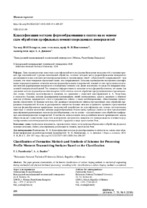Классификация методов формообразования и синтез на ее основе схем обработки профильных моментопередающих поверхностей

Date
2020Publisher
Another Title
Classification of Formation Methods and Synthesis of Schemes for Processing Profile Moment-Transmitting Surfaces Based on the Classification
Bibliographic entry
Пантелеенко, Ф. И. Классификация методов формообразования и синтез на ее основе схем обработки профильных моментопередающих поверхностей = Classification of Formation Methods and Synthesis of Schemes for Processing Profile Moment-Transmitting Surfaces Based on the Classification / Ф. И. Пантелеенко, А. А. Данилов // Наука и техника. – 2020. – № 4. – С. 280-287.
Abstract
Дана характеристика известных классификаций методов формообразования поверхностей в машиностроении при механической и физико-технической обработке, согласно которым метод формообразования поверхности рассматривается как сочетание методов формирования ее производящих линий – образующей и направляющей – при условии, что темп генерации образующей выше, чем направляющей. Показаны преимущества построения классификации и формализованного описания методов формообразования поверхностей; каждый из них представляет сочетание методов формирования поверхности в поперечном сечении и по длине независимо от скорости генерации образующей и направляющей линий. Это повышает информативность описания метода формообразования, что важно для сравнения методов формообразования поверхностей и синтеза схем их обработки при функциональном проектировании станка. Отмечена целесообразность введения, по сравнению с известной классификацией А. А. Федотенка, в множество базовых методов формирования производящих линий (копированием, следом, касанием и обкатом) методов огибания, прерывистого следа и прерывистого обката, а также комбинированных, объединяющих преимущества образующих их базовых методов, что расширяет возможности синтеза прогрессивных схем обработки профильных поверхностей. Исходя из расширенного множества базовых методов и принятого принципа представления методов формообразования профильных поверхностей разработана их классификация как основа систематизации известных и синтеза возможных методов формообразования. Рассмотрены примеры синтеза на базе предложенной классификации рациональных методов формообразования, а на их основе – прогрессивных схем обработки профильных моментопередающих поверхностей. В частности, использование метода огибания вместо применяемого метода обката позволяет существенно упростить конструкцию инструмента, повысить его универсальность и точность формообразования моментопередающих поверхностей с профилем в виде треугольника Рело.
Abstract in another language
The paper presents characteristics of the known classifications of surface shaping methods in mechanical engineering during mechanical and physical-technical processing; according to the classifications a surface shaping method is considered as a combination of methods for generating its producing lines – generatrix and guide – provided that the generation rate of the generatrix is higher than the guide. The advantages of constructing a classification and a formalized description of surface shaping methods have been shown in the paper; each of them represents a combination of surface formation methods in cross section and in length, regardless of generation speed for generatrix and guide lines. This increases information content of the description for a shaping method which is important for comparing methods of shaping surfaces and synthesis of schemes for their processing in the functional design of the machine. The paper has revealed the fact that in comparison with the well-known classification of A. A. Fedotenka it is an expedient to introduce methods of bending, intermittent track and intermittent rolling, as well as combined methods combining advantages of their basic methods which expand the synthesis of progressive processing schemes for profile surfaces. The introduction of the methods has been made in many basic methods of generating production lines (copying, following, touching and rolling). Based on the expanded set of basic methods and the accepted principle of presenting the methods of shaping profile surfaces, their classification has been developed as the basis for systematization and synthesis of known and possible shaping methods. The paper considers examples of rational shaping method synthesis based on the proposed classification and progressive processing schemes for profile moment-transmitting surfaces on the basis of synthesis examples. In particular, the use of an envelope method instead of the applied rolling method has made it possible to simplify significantly a tool design, to increase its versatility and accuracy in formation of moment-transmitting surfaces with a profile in the form of a Relo triangle.
View/
Collections
- № 4[11]
